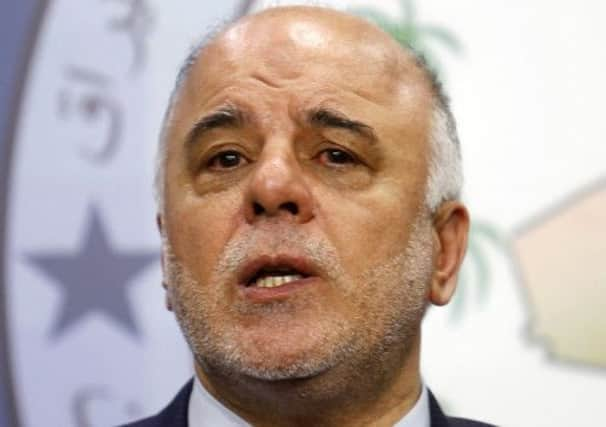‘Unity’ figurehead could push Iraqis further apart


After a day of political turbulence which could have repercussions on the ground, the British aid effort is also to be stepped up to ease the plight of thousands of people trapped on Mount Sinjar, with Foreign Secretary Philip Hammond warning of a “potential humanitarian disaster on a huge scale.”
With growing concern at the jihadist insurgency in the north, Fouad Massoum gave Haider al-Abadi 30 days to form a new administration, in a move designed to reach out to Iraq’s fractured political factions.
Advertisement
Hide AdAdvertisement
Hide AdThe development was widely welcomed by the international community, with UN Secretary General Ban Ki-moon yesterday describing it as “the forward movement toward government formation in Iraq.”
However, allies of the incumbent, Mr al-Maliki, who wants to stand for a third term, defiantly rejected the nomination, saying Mr al-Abadi, who attended Manchester University, had no legitimacy.
Mr al-Abadi, who pledged to form a government to “protect the Iraqi people,” was nominated for the post by the Iraqi National Alliance, a coalition of Shiite parties that includes that of Mr al-Maliki.
The powerful Shiite cleric, Muqtada al-Sadr, whose movement controls dozens of seats in parliament, expressed his support for Mr al-Abadi’s nomination, describing it as the “first sign” the country was heading back to safety.
“I think that this nomination will be an important start in order to end the crisis that the people are undergoing, such as security and service problems,” he said.
Critics of Mr al-Maliki, a Shiite, claim he has contributed to the crisis facing the country by pursuing a sectarian agenda that alienated Sunni and Kurdish minorities.
Mr al-Abadi’s nomination came hours after Mr al-Maliki deployed his elite security forces in Baghdad and partially closed two main streets – popular spots for demonstrations – as hundreds of his supporters took to the streets, raising fears he might use force to stay in power.
US vice-president Joe Biden congratulated Mr al-Abadi on his appointment and offered his commitment to “fully support a new and inclusive Iraq government.”
Advertisement
Hide AdAdvertisement
Hide AdMeanwhile, Downing Street confirmed the RAF will send “a small number” of Tornado jets to the region to improve the UK’s surveillance capability to help the humanitarian effort.
The UK will also look at how it can help get equipment to Kurdish forces as they are better able to counter the Islamic State (IS), No 10 added.
The move follows an aborted attempt to deliver aid to the Yazidis on Mount Sinjar, which was called off when the RAF aircrew decided that the supplies could have injured the desperate people below. Speaking after a Cobra committee meeting, Mr Hammond said: “The meeting we had this morning in Cobra looked at all the options available to us to step up our humanitarian support, including obtaining better situational awareness of what’s going on on the mountain, both to facilitate the air drops and to start planning how we are going to get people out.”
The next airdrop of humanitarian aid in northern Iraq is likely to be carried out within 24 hours.
The UK has already made one successful aid flight, dropping supplies including water and solar lanterns, on Mount Sinjar, where members of the of Yazidi minority are trapped in extreme conditions after fleeing the advance of the IS forces. Mr Hammond rejected calls for Parliament to be recalled to discuss the crisis and said there were no plans for British military involvement, saying: “We don’t envisage a combat role at the present time.”
Prime Minister David Cameron, who is on holiday in Portugal, has been urged to call MPs back from their summer break to discuss the crisis and he has also faced pressure to consider a military intervention.
Head of the army Lord Dannatt warned the risk of a genocide unfolding meant further help should be considered, arguing that the UK shared “some culpability” for the breakdown in Iraqi society.
There is “compelling” evidence that IS is in possession of modern weaponry gifted to the Iraqi army but abandoned in the face of the rapid extremist advance”, he said.
Advertisement
Hide AdAdvertisement
Hide AdBut Mr Hammond dismissed recalling Parliament, adding: “I don’t think that’s necessary at this time. We are talking about a humanitarian intervention. We have a very clear convention about consulting parliament before British forces are committed into any kind of combat role.
“We are not talking about that here, we are simply talking about a humanitarian action, stepping up what we are doing in order to support this community trapped on the mountain.”